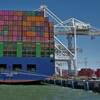Brazil Truck Strike Diminishes
Some truck drivers in Brazil continued blocking roads on Tuesday, slowing grains deliveries to southern ports, even as adherence to the strike diminished and a key highway in top soy state Mato Grosso opened.
Nationwide, there were 18 roadblocks over rising freight costs by the end of the day on Monday, well below peaks of more than 100 a week ago, federal highway police said.
With the two-week-old protests concentrated in the south, however, the situation at No. 2 soy exporting port Paranagua remained critical, a spokesman said.
On Monday just over 700 trucks arrived at the port, less than half the normal amount for this time of the year. With stocks running out, the port can only guarantee exports of soybeans and soymeal through Wednesday, the spokesman said.
In the state of Rio Grande do Sul, where protests have turned violent, police arrested 20 people on Monday and 11 roadblocks remained on Tuesday, local highway police said.
Seventy percent of operations at the Rio Grande port were affected by the strike, a spokesman said. The port plans to finish an analysis of grains stocks by Thursday and was not at risk of running out before then, he added.
The BR-163 highway, a key soybean corridor in the center-west state of Mato Grosso, was completely clear for the first time since protests ignited on Feb. 17, highway operator Rota do Oeste said on Tuesday.
Truckers in the state said protests had paused temporarily for government negotiations.
"It's a truce due to the meeting this Tuesday in Brasilia," said trucker Junior Boscoli of Lucas do Rio Verde, Mato Grosso, on the phone from Brazil's capital.
Besides slowing grain deliveries, the movement has blocked meat exports and left some grocery stores with bare shelves.
BRF SA, the world's largest poultry exporter, said on Monday it had reopened plants that were closed due to the strike. Meat processor JBS SA obtained an injunction guaranteeing security so its trucks could get access to the Itajai port in Santa Catarina, a spokesman said.
Brazilian President Dilma Rousseff on Monday signed into law a new truckers' bill to lower toll costs, waive fines for overweight trucks charged in the past two years and build more rest stops on federal highways.
Some drivers said the bill did not address their main demands to lower diesel fuel prices and raise their payments to cover costs.
By Caroline Stauffer and Gustavo Bonato













